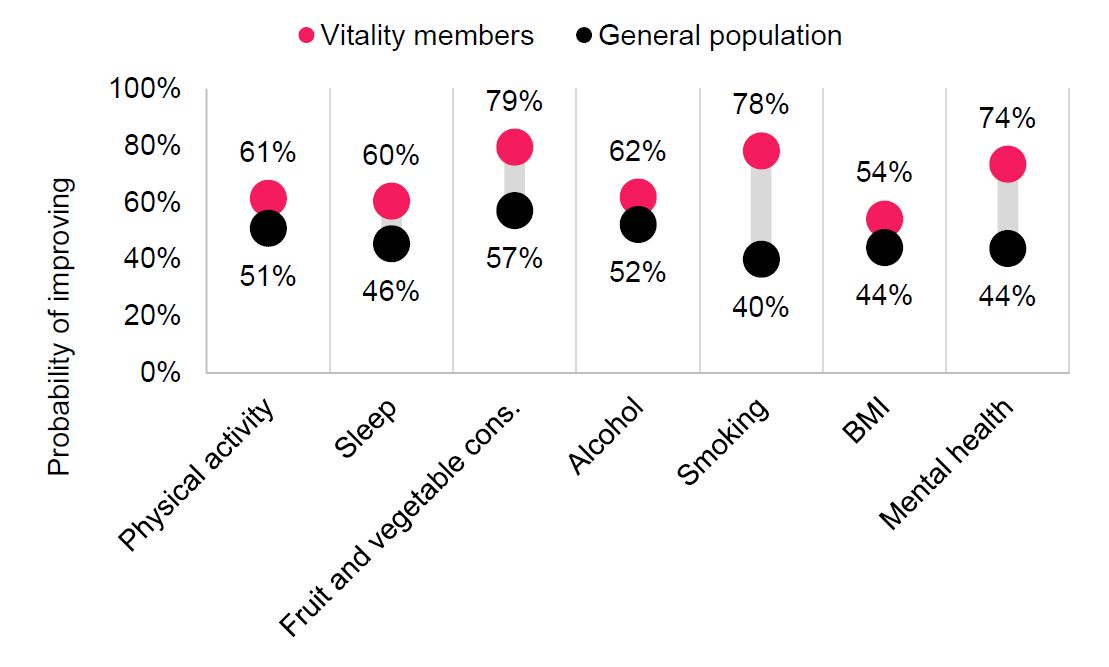Behavioural science and the road to healthier living
Published: 17/03/2021
Across seven key lifestyle factors, members engaged with the Vitality Programme are at least 10% more likely to improve their health1.
There’s no doubt that we’re living in extraordinary times. The Covid-19 pandemic has not only transformed the way we live our daily lives, but also placed our everyday health and wellbeing firmly in the spotlight.Thanks to a rise in life expectancy, we’re living longer but not necessarily healthier. Some of the most common chronic health conditions affecting us today are linked to behavioural science and lifestyle. These lifestyle diseases include the likes of coronary heart disease, stroke, type 2 diabetes, some cancers, obesity and hypertension. Recent figures show that heart disease, for example, was one of the leading causes of death in the UK2 – a trend that’s been developing for a number of years3.
Evidence suggests that the risk of developing these conditions could be reduced by improved habits. A recent behavioural science study featured in The BMJ4 of over 100,000 people looked at five healthy lifestyle habits that if adopted would have an impact on life expectancy and disease risk. These areas were – not smoking; maintaining a healthy BMI of between 18.5-24.9; getting at least 30 minutes of exercise a day; drinking less than two units (women) or four units (men) of alcohol a week and eating well (a diet score in the top 40% of people in the study).
The study found that people who adopted at least four of these healthy habits were likely to live an extra seven to 10 years free of certain chronic health conditions and cancers compared to those who adopted none.
Some factors, such as age, can’t be changed. However, in line with published research, insights from Vitality conclude that the body’s ability to fight the virus and its negative consequences can be impacted significantly by lifestyle factors. It’s something that received significant public exposure from early in the pandemic, when these groups were identified as clinically vulnerable and considered at much higher risk of hospitalisation.
The Government subsequently launched a campaign to tackle one risk factor – obesity - as part of its pandemic response5. Around two-thirds of UK adults are classed as overweight and the policy paper for the campaign stated that there’s ‘consistent evidence’ this group are more likely to suffer complications from the virus.
Good health is more important now than ever
Findings from our business health survey Britain’s Healthiest Workplace (BHW) show that some of these health trends are worsening among the UK’s working population. In recent years, businesses have paid increasing attention to the health and wellbeing of their workforce, because of its proven impact on engagement and productivity – with many investing in business health initiatives. In the workplace, better health and wellbeing results improved work engagement and reduced productivity loss through absenteeism and presenteeism (where a person is present at work but not functioning at full capacity because of poor physical or mental health).However, between 2015 and 2019 the rate of BHW respondents who weren’t eating a healthy diet and could be considered obese rose by 27.5%. For those who had moderate or severe symptoms of depression, the increase was even more alarming, by 107.3%6. Good health is more important now than ever – not only for general wellness among the population, but also for the added benefit of better Covid-19 outcomes. As we spend around a third of our lives at work7, employers have a huge role to play in improving the health of their employees. This was especially important during the absence of an effective national vaccination programme and the uncertainty around Covid-19 risk going forward, or indeed any other future widespread health crisis.
Encouraging healthy living underpins our core purpose
The pressures of modern life and work mean we’re busier and more stressed now than we’ve ever been, which means our health can often take a backseat. We’ve found that people aren’t always aware of their health, or overestimate how healthy they are and as a result, only seek help once a health issue has arisen. Socio-economic factors are also relevant – so as an employer, it’s important that any workplace health solutions cover the whole workforce as it’s often those at the lower end of the pay-scale who are most impacted.As such, encouraging healthy living has always been fundamental in our approach and it’s underpinned in our core purpose - to make people healthier and to enhance and protect their lives.
Our Vitality at Work offering utilises behavioural science as well as an ongoing wealth of member data to empower people to take charge of their health. It offers a unique health and engagement proposition and gives employers a cost-effective way to give their entire employee population access to health support, without necessarily having to enrol them on a health plan.
How the Vitality Programme works
The Vitality Programme’s approach is three-fold – addressing some of the most common pain points around health.
1. Better understanding of health
2. Improving employee health
3. Behavioural science
The Vitality Programme is proven to improve individual health. Across seven key lifestyle factors, members engaged with the Vitality Programme were at least 10% more likely to improve compared to the general population:

Our most recent data shows:
- A quarter (26%) of Vitality members who completed an annual Health Review improved their diet within the first year of participating in the Programme.
- Just under half (42%) started doing more exercise and 28% showed a lower risk for depression than when they joined the Programme.
- Employees in the Vitality Programme were five times more engaged than those enrolled in other workplace wellness programmes, as well as having 12.2% greater productivity.
- The Programme also provided an estimated £103m worth of value (through rewards and benefits) to members in 20198.
We estimate that someone aged 65 who’s highly engaged in their health and wellness could experience a 22% lower Covid-19 mortality risk than an unengaged 45-year old, and similar patterns are observable for other diseases and conditions as well.
Beyond Covid-19, increased life expectancy and the number of years lived in good health can help reduce the risks associated with aging and chronic conditions. The benefits of this are reflected across all areas of life; It’s good for society and our health service thanks to the potential of less demand and is also good for the economy through a more engaged and productive workforce.
Find out more about the Vitality Programme and how it can benefit your clients.
Sources:
1. Vitality Data
2.https://www.ons.gov.uk/peoplepopulationandcommunity/birthsdeathsandmarriages/deaths/bulletins/monthlymortalityanalysisenglandandwales/august2020
3. https://www.who.int/news-room/fact-sheets/detail/the-top-10-causes-of-death
4. https://www.bmj.com/content/368/bmj.l6669
5. https://time.com/5872175/boris-johnson-weight-loss-coronavirus/
6. BHW stats 2019 (Vitality data)
7. https://www.gettysburg.edu/news/stories
8. Vitality Data
Where to next?
-
Can a healthier body really lead to a healthier mind?
There are growing signs that positive lifestyle decisions taken now could lead to positive effects on mental capacity in later life.
-
The must-have employment benefits post COVID-19
Our latest data shows that we’re more at risk of anxiety and stress than pre-lockdown, it’s so much more important for your clients’ businesses to focus on wellbeing at work.
-
Insights Hub
Our Insights Hub brings you our range of adviser content - from video series to articles & blogs.


